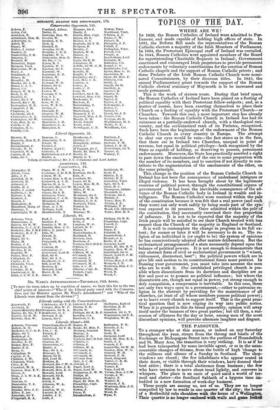TOPICS OF THE DAY.
WHERE ARE WE
IN 1829, the Roman Catholics of Ireland were admitted to Par- liament, and made capable of holding high offices of state. In 1831, the Reform Bill made the representatives of the Roman Catholic electors a majority of the Irish Members of Parliament. In 1834, the Protestant Episcopal staff of Ireland was curtailed. In 1844, Roman Catholics were appointed members of the Board for superintending Charitable Bequests in Ireland ; Government sanctioned and encouraged Irish proprietors to provide permanent endowments by voluntary contributions for the erection of Roman Catholic chapels and the support of Roman Catholic priests ; and three Prelates of the Irish Roman Catholic Church were nomi- nated Commissioners, by their diocesan titles. In 1845, the annual Parliamentary grant towards the support of the Roman Catholic clerical seminary of Maynooth is to be increased and made permanent. This is the work of sixteen years. During that brief space, the Roman Catholics of Ireland have been placed on a footing of political equality with their Protestant fellow-subjects; and, as a matter of course, have been exerting themselves to place their Church on a footing of equality with the Protestant Church—or Churches. Towards this end, a most important step has already been taken : the Roman Catholic Church in Ireland has had its existence as a partially-endowed church, with a theological uni- versity, and the ecclesiastical rank of its Prelates, recognized. Such have been the beginnings of the endowment of the Roman Catholic Church in every country in Europe. The attempt to shut our eyes would be vain—the fact stares us in the face, that there are in Ireland two Churches, unequal in point of revenue, but equal in political privilege—both recognized by the State as capable of holding, as deserving to possess, permanent endowments. Moreover, the State has practically asserted a right to pare down the emoluments of the one to some proportion with the number of its members, and to sanction if not directly to con- tribute to the augmentation of the emoluments of the other, on the same principle. This change in the position of the Roman Catholic Church in Ireland has not been the consequence of underhand imtrigues or illegal violence. It has been brought about by the legitimate exercise of political power, through the constitutional organs of government. It has been the inevitable consequence of the ad- vance of the Roman Catholic body in Ireland in wealth and in- telligence. The Roman Catholics were received within the pale of the constitution because it was felt that a real power (anti such, they were) earl only work safely by being made part of the sys.,2 tern exposed to its pressure. Once admitted within the pale'Of the constitution, they necessarily exercised their due proportion of influence. It is not to be expected that the majority of the Irish people will be satisfied to see their Church treated with less respect than the Church of the majority in England or Scotland. It is well to contemplate the change in progress in its full ex- tent ; for sooner or later it will be necessary to do so. The re- ligion of an individual is (or ought to be) the system of opinions he has conscientiously adopted after mature deliberation. But the ecclesiastical arrangements of a state necessarily depend upon the balance of political powers. It is not enough to demonstrate that any abstract form of civil or ecclesiastical government is "wisest, virtuousest, discreetest, best"; the political powers which are to 'ye life and motion to its constitutional forms must preexist. In framing your government, you must take into account the men who are to work it. One established privileged church is pos- sible where dissentients from its doctrines and discipline are so few and poor as to possess no political influence but where the dissentients are, though not equal in power, yet strong enough to defy compulsion, a compromise is inevitable. In this case, there are only two ways open to a government,—either to patronize re- ligion in the abstract by providing for the maintenance of all churches, (at least of all whose members possess political power); or to leave every church to support itself. This is theprac- tical question that is now edging its way into public notice. When it is grasped in this its broad generality, opinion will array itself under the banners of two great parties; but till then, a suc- cession of alliances for the day or hour, among men of the most discordant opinions, will provoke alternate laughter and disgust.


























 Previous page
Previous page